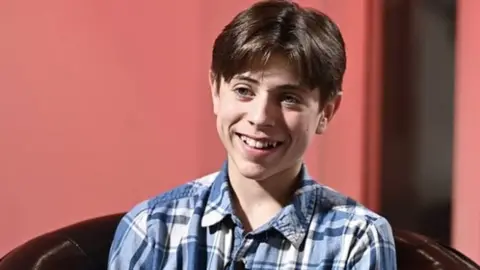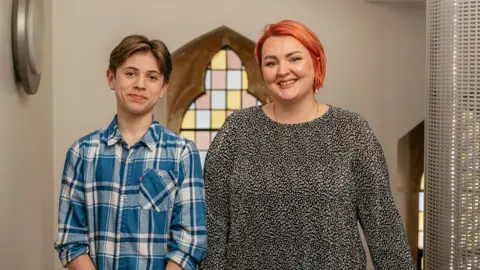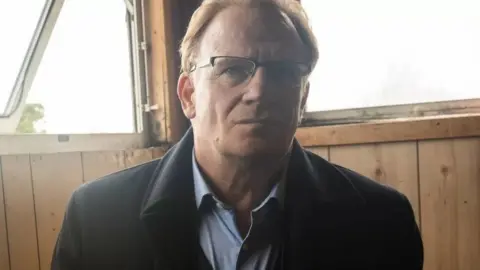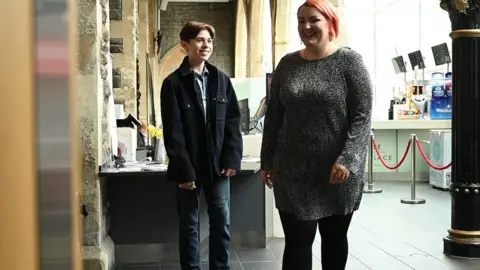BBC Young Reporter: 'I'm worried I'm losing my Welsh'
 BBC
BBCI was 11 years old when I left my Welsh-language primary school in Cardiff to study ballet in London.
By making the move to the city, I left my Welsh lessons behind.
My new friends were international and bilingual but none of them could speak Welsh. I was surrounded by French and Spanish speakers but not many of them knew much about my own language.
Months would go by in London without me hearing or speaking Welsh.
Quickly, I felt as if I was losing my confidence. I forgot words. I worried about speaking my language.
As a BBC Young Reporter, I wanted to consider how and why people lose confidence in their linguistic ability.
As a keen performer, I want to know how Welsh speakers can use modern platforms to promote the language and encourage others to engage with it.
'Nobody's Welsh is perfect'
Singer and presenter Bronwen Lewis has had big success on TikTok sharing her Welsh translations of pop songs by the likes of Ed Sheeran and Coldplay.
Like me, she left Wales to study in London.

"It's not easy to keep your language when you move out of Wales," she says.
"If you haven't got people around you that you're able to speak Welsh with, it can feel really sort of lonely."
As someone who now lives and works bilingually in Wales, Bronwen says it's the responsibility of fluent Welsh speakers to encourage others and make them feel "comfortable" speaking Welsh.
"It's sort of getting across to those non-Welsh speakers that you're safe to learn and you will be included when you chose to learn.
"That is something that we have to keep battling on against is people not feeling welcome."
'Welsh has to be alive and kicking'
Mark Lewis Jones is a bilingual actor who has starred in dramas like The Crown and Keeping Faith.
He says he understands why people might struggle with their confidence when it comes to speaking Welsh.
"I was brought up bilingually, but my English is better than my Welsh," he says.
"I've found over the years that working in Welsh so much, my Welsh has improved greatly. I'm much more comfortable now than I was 20 years ago, for instance."
Mark recently starred in the Welsh-language drama Dal y Mellt which is now being streamed on Netflix.
He says hearing and seeing Welsh on international streaming sites "cannot be underestimated".
"It's fantastic that we can watch these programmes, and films, and series in their original language. I think it's absolutely huge that this is happening."
He hopes the second series will also be put on the streaming platform and "pick up the kind of following the Scandy [Scandinavian] series' have had over the years".
 Dal y Mellt/S4C
Dal y Mellt/S4CMark believes the arts can play a "huge part" in ensuring Welsh is relevant on an international scale.
"Welsh could so easily become a kind of quaint, little, historical museum piece in terms of linguistics," he argues.
"It has to be alive and kicking and modern and be seen on these platforms so that people can see it's a real living language.
"If we can continue to be outward-looking and modern and keep that freshness about it, it has a chance of flourishing and surviving."
'I feel more comfortable with my Welsh now'
Having spoken to people like Bronwen about her relationship with the language, I feel more confident.
Bronwen's idea that you can "speak your own kind of Welsh" made me feel more comfortable with how I speak.
I can see how I can weave it into my daily life, such as when I game with my friends or watch TikTok. It's the simple things.
Chatting informally in a relaxed environment will help my confidence grow.

Mark made me realise that I can pursue my ambitions bilingually as a performer.
He said he had to work on his Welsh and I know that I can work on mine.
I'm proud to be bilingual and, as Bronwen reminded me, it's not the fact that I'm speaking perfectly that's important - it's the fact that I can.
You can find stories by other young people on the BBC Young Reporter website.

- A SPECIAL SCHOOL: Behind the scenes at a school like no other
- DARE TO DANCE: 'When I dance I feel like I can overcome anything'

